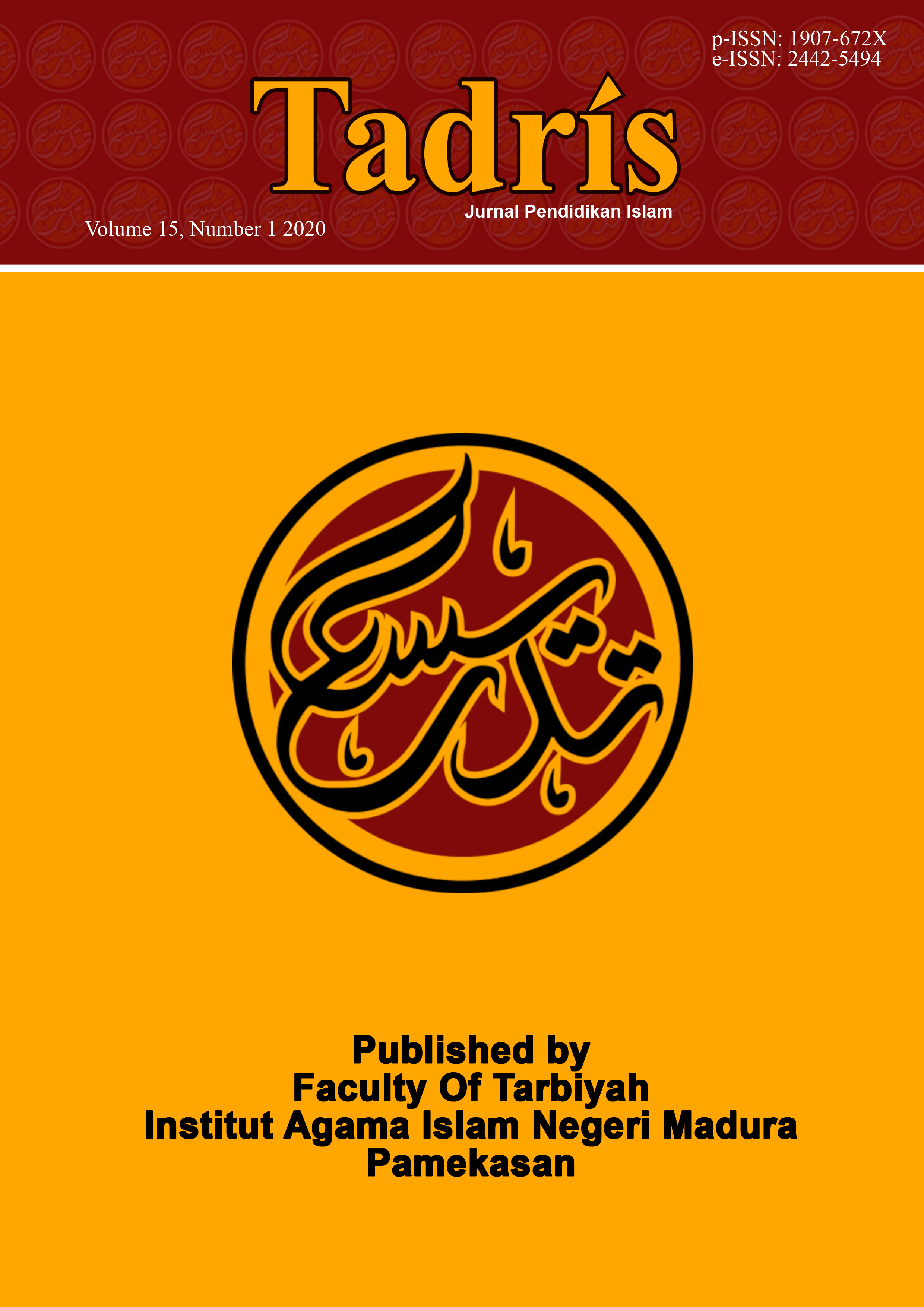Pembelajaran Kitab Kuning dengan Bahasa Inggris di Pondok Pesantren Annuqayah Latee Guluk-Guluk Sumenep
 Abstract views: 273
,
Abstract views: 273
,
 PDF downloads: 320
PDF downloads: 320
Abstract
It was very rare the researchers who studied the learning of classical book with English in Islamic boarding schools, whereas learning classical book with English was really important for the progress of the times, santri who were studying classical book with English could simultaneously get two fields of science and could be a special attraction in preaching to face modern society. The results showed that, 1. The implementation of the learning classical book with English was carried out twice a week that was called as the first session and the second session, while the method used was Bandongan and discussion method. Bandongan was held in the first session and the discussion method was carried out in the second session. 2. The level of santri's understanding of learning classical book with English was very good. 3. The problems were the implementation of the first session was very early morning, santri’s understandings were different and some boards didn’t join the first session of program. Learning classical book using English was worth maintaining and continues to be developed. The positive influence was felt a lot by santri, besides being able to learn English that they could also learn classical book both nahwu-sharraf science and its contents.
Downloads
References
Arifien, Muzayyin.2011, Kapita Selekta Pendidikan Islam ( Islam dan Umum), Jakarta: Bumi Aksara.
Arikunto, Suharsimi. 2002, Prosedur Penelitian Suatu Pendekatan Praktek. Jakarta: Rineka Cipta.
Asf, Jasmani. 2013, Supervisi Pendidikan, Jogjakarta: Ar- Ruzz Media.
Dimyati dan Mudjiono, 2013, Belajar dan Pembelajaran Jakarta: Renika Cipta.
Fadli, Adi 2012, Pesantren: Sejarah dan Perkembangannya, EL- HIKAM: Jurnal Pendidikan dan Kajian Keislaman, Vol. V Nomor 1, Januari-juni. 39.
Haidar, HM. Amin. 2004. Masa Depan Pesantren dalam Tantangan Modernitas dan Tantangan Komplesitas Global, Jakarta: IDR PRESS.
Kasiram, Moh. 2010, Metodologi Penelitian Kualitatif dan Kuantitatif, Malang: UIN Maliki Press.
Khotijah, Siti. 2017, “Manajemen Pembelajaran Pendidikan Agama Islam Di SLB PGRI Buddagan Pademawu Pamekasan”, Tesis Pascasarjana STAIN Pamekasan.
Moleong, Lexy J. 2017, Metodologi Penelitian Kualitatif, Bandung: PT. Rosdakarya.
Muhakamurrohman, Ahmad 2014, Pesantren, Santri, Kiai dan Tradisi, Jurnal
Mulyono, 2012, Strategi Pembelajaran, Jogjakarta: UIN Maliki Press.
Nasih, Ahmad Munjin. dan Lilik Nur Kholidah, 2013, Metode dan Teknik Pembelajaran Pendidikan Agama Islam, Bandung: Refika Aditama
Purwanto. 2014, Evaluasi Hasil Belajar, Jogjakarta: Pustaka Pelajar.
Roestiyah, 2012, Strategi Belajar Mengajar, Jakarta: Asi Pahasatya.
Saridjo, Marwan. 1980, Sejarah Pondok Pesantren di Indonesia, Jakarta: Darma Bhakti.
Sugiyono. 2009, Metode Penelitian Kuantitatif, Kualitatif dan R&D. Bandung: Alfabeta.
Sutrisno, Budiono Hadi. 2009, Sejarah Wali Songo Misi Pengislaman di Tanah Jawa, Jogjakarta Graha Pustaka.
Tim Penyusun, 2003, Jejak Masyayikh Annuqayah, Kado Alumni Pondok Pesantren Annuqayah Latee, Sumenep: Alatee Press.
Tim Penyusun, 2018, Laporan Akhir Tahun English Area of Latee Pondok Pesantren Annuqayah Latee.
Tim Penyusun, 2018, Laporan Akhir Tahun Pondok Pesantren Annuqayah Latee, Sumenep: Alatee Press.
Copyright (c) 2020 TADRIS: Jurnal Pendidikan Islam

This work is licensed under a Creative Commons Attribution-NonCommercial 4.0 International License.
The journal operates an Open Access policy under a Creative Commons Non-Commercial 4.0 International license. Authors who publish with this journal agree to the following terms:
- Authors retain copyright and grant the journal right of first publication with the work simultaneously licensed under a
 Commons Attribution-NonCommercial 4.0 International License
Commons Attribution-NonCommercial 4.0 International Licensethat allows others to share — copy and redistribute the material in any medium or format, and adapt — remix, transform, and build upon the material.
- Authors are able to enter into separate, additional contractual arrangements for the non-exclusive distribution of the journal's published version of the work (e.g., post it to an institutional repository or publish it in a book), with an acknowledgement of its initial publication in this journal.
- Authors are permitted and encouraged to post their work online (e.g., in institutional repositories or on their website) prior to and during the submission process, as it can lead to productive exchanges, as well as earlier and greater citation of published work (see The Effect of Open Access).














